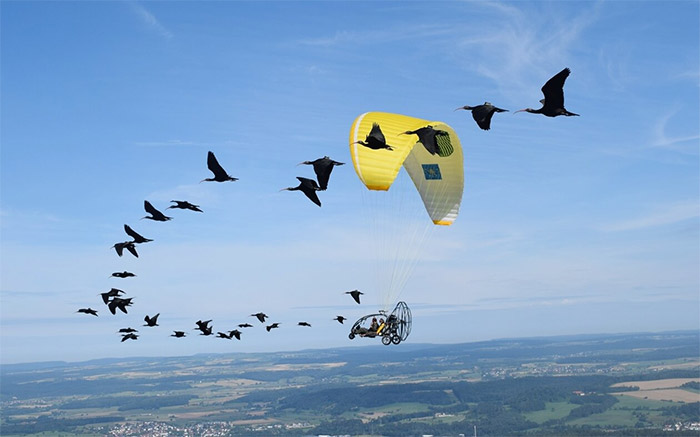He flies with bald ibis and teaches them new flight routes: Who is biologist Johannes Fritz?
Years ago, biologist Johannes Fritz flew bald ibis and taught them a new migration route, helping them survive on the European continent. Climate change has also made this route impassable. Fritz is now teaching the birds a longer but safer route.

Austrian maverick biologist Johannes Fritz had to do something to prevent the extinction of his beloved birds. Just like it did years ago… Once completely lost from European skies, northern bald ibis must migrate south across the Alps before the weather becomes impassable in order to survive through the winter. However, the changing climate structure delayed the time when the birds started to migrate, and now they reach the mountains too late. That means they freeze to death.
First, he gets used to it by loving.
Fearing that they would become extinct again in two or three years, Fritz decided to teach the birds a safer migration route by guiding them with a small plane. He is confident that he can implement this bold and unconventional plan because he has done it before.
56 years ago, the northern bald ibis, a black bird the size of a goose at birth with a bald head and huge beak, could only be found in captivity in Europe. About 400 years ago, Europeans probably ate the last representative of this bird species on the continent. However, Fritz devoted his career to reintroducing these birds to nature. It teaches young birds the migration route they will follow when they become adults. For this purpose, he learned to fly by modifying an ultra-light aircraft that could travel at speeds slow enough for his wing students to catch up.
Transported flightless birds by bus
He takes birds that are a few days old and gives them food. He loves and hugs them. Bald ibis also eagerly follow their teacher, who pilots the rather noisy plane. After three years of several ups and downs, he took his first herd from Austria to Italy in 2004. He has since led 15 migrations. During this time, he reintroduced 277 young bald ibis to the wild. Many of these birds then began to pass the route to their offspring. But the route he originally taught the birds is no longer healthy either. When the shores of Lake Constance in Germany and Austria, where birds spend the summer due to climate change, warmed up, the birds began to migrate at the end of October, not at the end of September, as it was ten years ago. Following the bird's progress last year, Fritz noticed that the birds' feathers were covered with snow and that they were struggling to find larvae and worms in the frozen soil.
Three bald ibis colonies tried to cross the mountains twice last November but were unsuccessful. Fritz hypothesized that the rising hot air currents were too weak to allow the birds to glide easily over the mountains in November. Thereupon, he lured the birds with mealworms, put them in crates, and carried them over the Alps. However, this particular bus service was not sustainable. It was supposed to show the birds a new migration route.
Now they are doing their first practice with the birds in Lake Constance. By October, they hope to reach Spain's South Atlantic coast, Cadiz, where the birds can spend the winter in comfort. The new route, which bypasses the Alps, is approximately 4 thousand kilometers. It's about three times longer than their previous route to Tuscany, directly south. It takes two weeks to reach Tuscany, flying at a maximum speed of 40 kilometers per hour. However, the new route is calculated to take six weeks. Raised on a mountain farm in Tyrol, Fritz grew up watching how cows and horses interact more freely with each other when taken from the barn to pasture. These childhood observations led him to become a biologist.
“A fawn was orphaned”
He started studying biology at the age of 20. However, before joining this program at the university, he took a formal job in charge of controlling local animal populations. But during this mission, he refused to kill mountain goats and deer. He pulled the trigger only once, at the insistence of his boss. “One fawn was orphaned,” says Fritz, describing that moment as a “dark spot” in his professional life.
